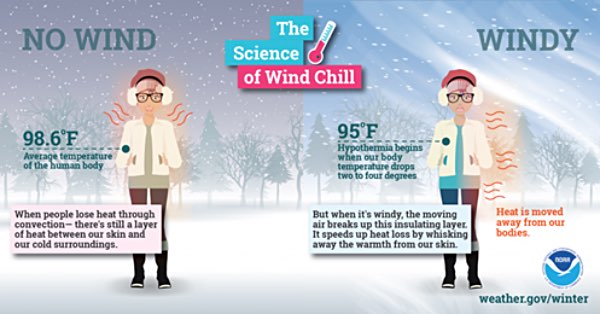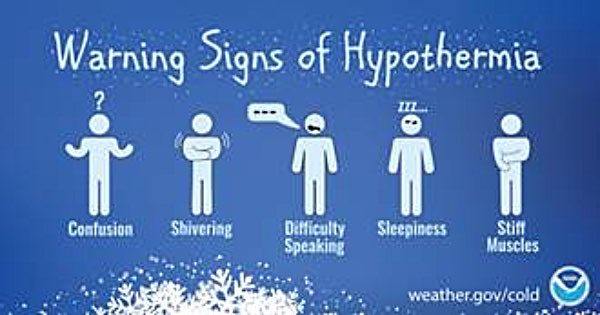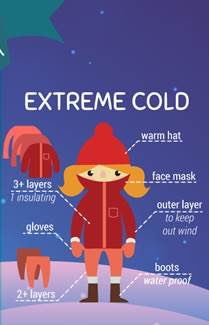- By Tompkins County Health Department
- News
 Print
Print 
The Nation Weather Service has issued a wind chill warning for Central NY from tonight through early Sunday. Wind Chill is the term used to describe the rate of heat loss from the human body resulting from both low temperatures and wind. As winds increase, heat is carried away from the body at a faster rate, causing skin temperature and eventually internal body temperatures to drop. "People exposed to extreme cold are susceptible to frostbite in a matter of minutes", stated Frank Kruppa, the Tompkins County Public Health Director. Areas most prone to frostbite are uncovered skin and the extremities, such as hands and feet. "Hypothermia is another threat during extreme cold", Kruppa warns.
"It is important to check on our neighbors during these events." Kruppa encourages, "Our seniors and young children are at significant risk". A small child will lose heat faster than older children and adults. A senior adult may be dealing with other health issues that compromise their ability to hold their body heat. Pets are also at risk during these low temperatures. If you have pets, bring them inside. If you cannot bring them inside, provide adequate, warm shelter and unfrozen water to drink.
It is also important to stay safe when heating your home, especially during a power outage. Take precautions to avoid exposure to carbon monoxide any time a fossil fuel such as natural gas, oil, or coal is burned. Make sure that both smoke detectors and carbon monoxide detectors are in working order. Carbon monoxide is an odorless, colorless gas and is hard to detect. Common symptoms of carbon monoxide (CO) poisoning are headache, dizziness, weakness, upset stomach, vomiting, chest pain, confusion, and can lead to death. Do not ignore these symptoms, especially if more than one person is feeling them. Get medical help right away.
Frostbite. Frostbite is the freezing of skin and body tissue Frostbite occurs after prolonged exposure to a cold environment. Frostbite causes a loss of feeling and color in affected areas. It can permanently damage body parts if not promptly treated.
Signs and Symptoms of Frostbite:
• Any discoloration of the skin such as flushed, white, yellow, or blue depending on the length of exposure
• Waxy appearance of skin
• Lack of feeling or numbness
Management of Frostbite:
• Handle the frostbitten area gently
• Do not rub the area
• Expose the affected area to a source of warmth
• Seek medical attention
Hypothermia, or lowered body temperature, can occur after prolonged exposure to cold environment.
Signs and Symptoms of Hypothermia:
• Shivering • Confusion
• Memory loss • Drowsiness
• Exhaustion • Slurred speech
• Glassy stare • Slow, irregular pulse
• Numbness • Decreased level of consciousness

Management of Hypothermia:
• Remove all wet/cold clothing
• Place individual in dry blankets/clothing
• If conscious, provide a warm beverage
• If you recognize these symptoms in yourself or others, immediately seek medical help
 Prevent Carbon Monoxide Poisoning
Prevent Carbon Monoxide Poisoning• Install a carbon monoxide detector which is battery powered or has a battery back-up and is certified by Underwriters Laboratories (UL).
• Have gas furnaces, gas water heaters, gas ranges and ovens, gas dryers, gas or kerosene space heaters, fireplaces, and wood stoves inspected by a trained professional at the beginning of every heating season. Be sure that the flues and chimneys are in good working condition.
• Choose appliances that vent their fumes to the outside whenever possible.
• Read and follow all the instructions that come with any fuel-burning device.
• Do not idle the car in a garage, even if the garage door to the outside is open.
• Do not use a gas oven to heat your home, even for a short time.
• Do not use a charcoal grill indoors, even in a fireplace.
• Do not sleep in any room with an unvented gas or kerosene space heater.
• Do not use any gas-powered engines (mowers, weed trimmers, snow blower, chain saws, small engines, or generators) in enclosed spaces.
General Safety Tips during Cold Weather:
• Stay indoors, if possible
• Do not drink alcoholic beverages, which cause the body to lose heat more rapidly
• Do not ignore shivering–it is an important first sign that the body is losing heat and a signal to quickly return indoors
When going outdoors, adults and children should wear:
• Several layers of loose-fitting clothing
• A wind and water-resistant coat
• A scarf to cover their face and mouth, hat, and gloves or mittens
• Insulated waterproof boots
For more information on how to reduce your risks from carbon monoxide contact the Upstate New York Poison Center at 1-800-222-1222 or visit www.cdc.gov/co/faqs.html.
For more information about hypothermia, frostbite, and other cold weather conditions, visit www.cdc.gov/disasters/winter/guide.html.



